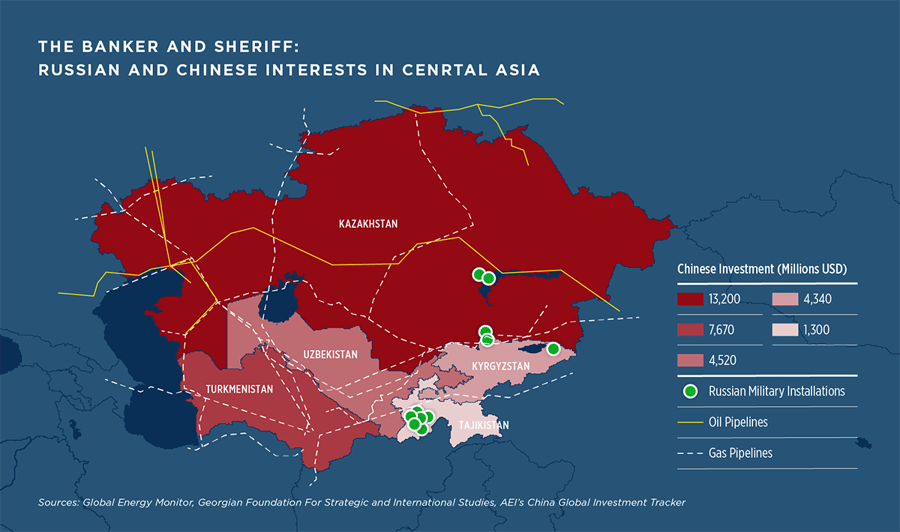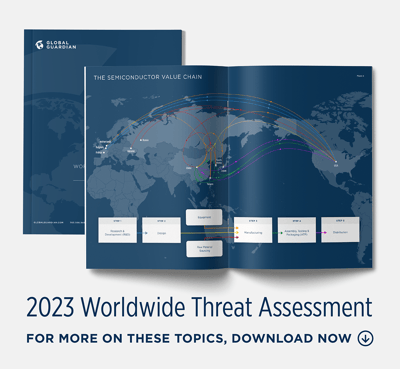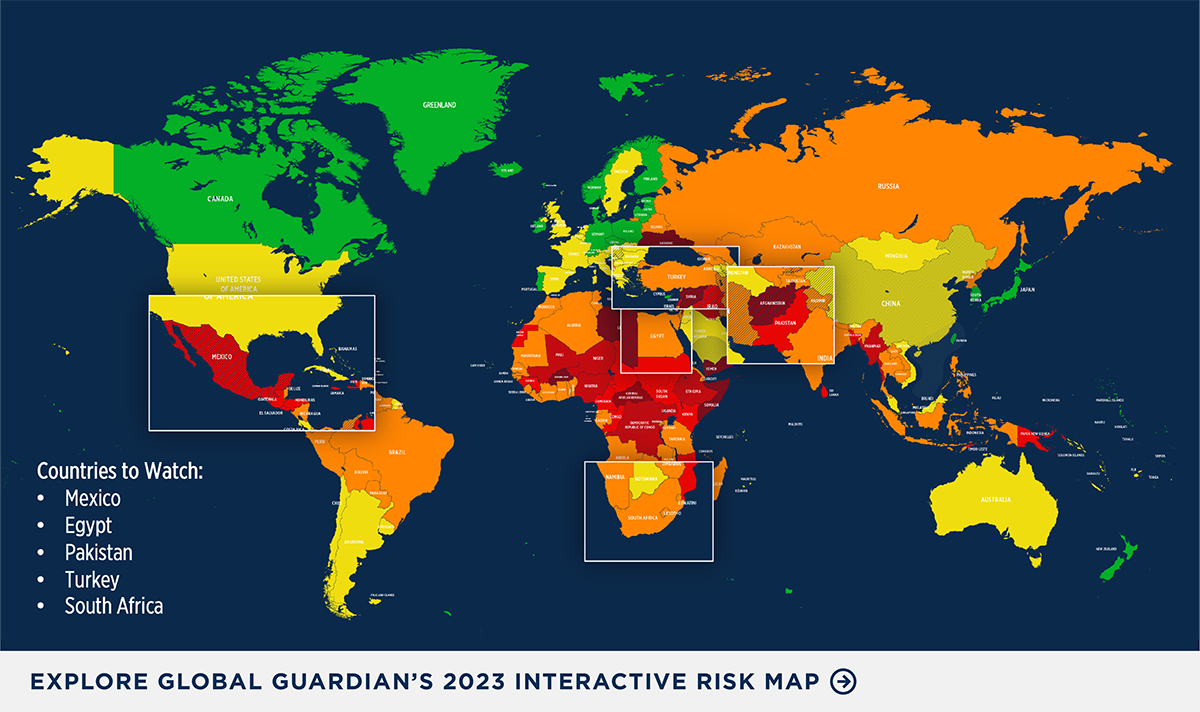As a business leader, you need to consider whether you can “get your people out of harm’s way once the environment goes sideways,” says Global Guardian CEO Dale Buckner.
A rapidly evolving global threat landscape has made it critical that businesses be better prepared for known and unknown risks in order to protect their people and assets while seamlessly serving their customers. “You have to plan for those worse-case scenarios and you have to stress test your platforms of insurance, duty of care providers, intelligence providers,” said Global Guardian Chief Executive Officer Dale Buckner. The “ultimate litmus test,” he said is: “Can you get your people out of harm’s way once the environment goes sideways?”
Buckner participated in a webinar hosted by Global Guardian on March 14 in which panelists discussed current and emerging threats to global security and the impact of these threats on global business. Other participants included former Deputy Director of National Intelligence Beth Sanner and Global Guardian Director of Intelligence Michael Ballard. Global Guardian Chief Operations Officer Mark Post moderated the discussion.
A Global Threat Assessment
The webinar followed the recent release of Global Guardian’s 2023 Worldwide Threat Assessment. Ballard and Buckner outlined the four potential areas of disruption from this report.
- Post-Soviet space in disarray: In the month before Russia’s February 24, 2022, invasion of Ukraine, Kazakhstan, another former Soviet republic, was roiled by mass protests over the government’s decision to lift the price cap on liquefied petroleum gas. Kazakh President Nursultan Nazarbayev called in Russian paratroopers to help “stabilize” the country.

However, Russia’s loss of troops, weapons, and money in the war in Ukraine has raised questions about its role in its neighborhood. “Are they still the sheriff? Are they still the guarantor of security in the area?” Ballard asked.
Russia’s setbacks in Ukraine have also raised questions about whether China will step into the role of security guarantor in the region. While China’s main motivation for keeping the peace is preserving its access to natural resource-rich countries like Kazakhstan, if China gets distracted by domestic issues or Taiwan it may create a dangerous security vacuum, said Ballard. In such a scenario, Ballard predicted there could be conflict over access to water, the future of China’s ambitious Belt and Road Initiative may be thrown into question, and access to critical minerals could be jeopardized -
 Geopolitics of semiconductors: Taiwan is the world’s largest producer of semiconductors. Taiwan Semiconductor Manufacturing Co., or TSMC, provides 92 percent of the most advanced semiconductor chips used in modern electronics. Rising tensions between China and Taiwan have stoked concerns about the supply of these critical chips. Last summer, U.S. President Joe Biden signed the CHIPS and Science Act into law. The act is aimed at revitalizing the domestic semiconductor industry and bringing supply chains back to the United States. Toward this end, TSMC has invested $40 billion in a chip manufacturing plant in Arizona, but some in the company are now having second thoughts about the decision.
Geopolitics of semiconductors: Taiwan is the world’s largest producer of semiconductors. Taiwan Semiconductor Manufacturing Co., or TSMC, provides 92 percent of the most advanced semiconductor chips used in modern electronics. Rising tensions between China and Taiwan have stoked concerns about the supply of these critical chips. Last summer, U.S. President Joe Biden signed the CHIPS and Science Act into law. The act is aimed at revitalizing the domestic semiconductor industry and bringing supply chains back to the United States. Toward this end, TSMC has invested $40 billion in a chip manufacturing plant in Arizona, but some in the company are now having second thoughts about the decision.China, too, is dependent on semiconductors for advanced technologies, weapons systems, and the Fourth Industrial Revolution, Ballard pointed out. The United States has taken steps to restrict the sale of chip technology to China. In October 2022, the Biden administration announced export controls that now require licenses for companies exporting chips to China using U.S. tools or software, no matter where in the world they are made.
Buckner described the Biden administration’s efforts to exclude China as a friction point between the United States and China. Ballard contended China may respond by blockading Taiwan to prevent the flow of semiconductors to other countries. “The semiconductor industry on Taiwan is a large part of why China may end up going to war over this tiny island,” he said.
Taiwan views its semiconductor industry as being its “silicon shield.” As the United States, Japan, and Europe take steps to decrease their reliance on Taiwan’s chip supply and woo TSMC to build factories domestically, it may lead to them becoming less willing to defend Taiwan in the future if China were to invade, Ballard said. The Taiwanese have raised similar concerns.
- Age of Aerial Vehicle Borne Improvised Explosive Device: The war in Ukraine has become a testing ground of weaponry, most significantly weaponized drones. Ballard expressed concern about “the ability of governments, local police departments, federal agencies to actually combat weaponized drones.” He noted that the threat is difficult to detect: “How can you tell whether a drone is just there taking pictures or whether it has got a grenade on it?”
“How can you tell whether a drone is just there taking pictures or whether it has got a grenade on it?”
“We think that in the future there is going to be a paradigm shifting moment where there is a major incident that is carried out by a weaponized drone,” said Ballard, adding: “As of right now, we think that the counter-drone technologies just aren’t there. They are not keeping up with what drones are capable of.”
-
China’s Gray Zone Fleet: China relies on its maritime militia to assert control across the South China Sea up to the so-called nine-dash line, well beyond its international maritime border. This gray zone fleet, which China claims are fishing boats and private vessels, is gathering intelligence and facilitating the building of artificial islands with airstrips, sheltered ports, and other military infrastructure.
Unlike in Ukraine, where Russia’s military buildup that preceded the invasion was evident beforehand, China would likely use its maritime militia to quickly blockade Taiwan, said Buckner.
Five Global Hot Spots
In her remarks, Sanner, who served as former U.S. President Donald Trump’s intelligence briefer, said the war in Ukraine had “accelerated, exacerbated, and even created new fissures and, certainly, more instability.” The impact of the war is most greatly felt in the Global South, she said. Global South countries—those in Latin America, Africa, Asia, and Oceania—are facing food inflation and shortages, unprecedented levels of debt, the ill effects of extreme weather, poor governance, corruption, weak institutions, and high levels of income disparity.
Sanner zeroed in on five global hot spots.

Mexico Mexico has become an important destination of nearshoring for companies, especially those based in the United States. Tesla, for example, is setting up an assembly plant in Nuevo León state. In 2022, foreign direct investment into Mexico was at the highest level in almost a decade. Mexico is also the top destination for U.S. tourists.
Despite these positive trends, Sanner said, Mexico is on a “downward trajectory.” Mexican cities regularly dominate lists of the world’s most dangerous cities. Earlier in March, four Americans were kidnapped by armed gunmen while they were on a trip to Mexico; two of them were later found dead.
Predicting a rise in kidnappings and hijackings, Ballard said the presence of foreign companies in Mexico will provide “juicy targets” for the cartels. “Cartels are really Mexico’s scourge. They fuel the endemic corruption, they undermine the weak governing institutions,” said Sanner. These criminal gangs often work hand in glove with law enforcement as was evident when a former Mexican cabinet official was recently convicted of taking millions of dollars in bribes to protect the violent drug cartels he was tasked with combating.
The situation in Mexico has worsened as a consequence of Mexican President Andrés Manuel López Obrador’s policies, said Sanner, noting that elections in 2024 will exacerbate poor policymaking. “None of this is good for us. We need a stronger neighbor to the south, but the trends are not good there,” she said.
Egypt As Egypt’s army chief, Gen. Abdel Fattah El-Sisi led the July 3, 2013 coup that ousted the country’s first democratically elected president. In 2014, he retired from the military and was elected president. El-Sisi quickly turned into an authoritarian leader. Meanwhile, rising food prices and levels of poverty are fueling public dissatisfaction with the government. Egypt today is on an unsustainable path of borrowing to survive, and El-Sisi is “a dead man walking,” said Sanner.
She said that while hard to predict, change in Egypt “could probably come very quickly and very violently.”
Pakistan This is a country where Sanner said decades of mismanagement, corruption, political instability, terrorism, global pressures, and the 2022 floods have taken a toll. High political drama is currently playing out in Pakistan where the government is seeking to arrest former Prime Minister Imran Khan. The country is also facing a surge in terrorist acts, mostly carried out by Tehrik-i-Taliban Pakistan.
Pakistan’s currency has been in freefall as talks with the International Monetary Fund (IMF) have dragged on. The severe lack of foreign exchange is crippling manufacturing, leading to shuttered factories and rising unemployment, raising the spectre of recession. Sanner predicted that since Pakistan has always been seen as “too nuclear to fail,” the IMF funding will go through. But that, she said, is “just a finger in the dike.”
Turkey Turkish President Recep Tayyip Erdogan is facing growing public anger following the February earthquake that killed some 50,000 people. The destruction caused by the earthquake will fuel inflation adding to public unrest, Sanner predicted.
Erdogan has ruled Turkey since 2003, first as prime minister and then as president since 2014. He faces a big test in the May 14 elections. Recent polls show Erdogan trailing 10 points behind his opposition challenger Kemal Kilicdaroglu.
On top of this uncertainty, Sanner pointed to the potential for a flare-up between Turkey and Greece as the leaders of both countries are up for re-election and intent on playing the nationalist card.
South Africa South African President Cyril Ramaphosa was recently mired in a corruption scandal, a scandal he seems to have survived. The country, meanwhile, is facing high unemployment, rolling blackouts that have crippled small businesses, severe water shortages, and a GDP average of 1.3 percent since 2010, Sanner said. She predicted that the ruling African National Congress could probably lose its majority in the 2024 elections, paving the way for a coalition government—the first in post-apartheid times—which would likely struggle to govern.
The Threat Posed by Iran and Israel
Sanner described Iran and Israel as the most destabilizing forces in the Middle East.
Israel has taken a dangerous turn after Prime Minister Benjamin Netanyahu put together a ruling coalition that includes far-right and religious political parties. As Netanyahu came to office in December 2022, Sanner said, he and Israel were “enjoying the best strategic position they have had in history.” Israel’s relations with the Arab states were flourishing and the question of Palestinian statehood was out of the headlines.
Sanner said Netanyahu’s government is now on a path to squandering this historic moment. Israel has seen a resurgence in violence involving Israelis and Palestinians. Meanwhile, Netanyahu’s attempts to diminish the power of the supreme court and strengthen that of the legislature, the Knesset, has provoked weeks of massive protests. Israeli President Isaac Herzog has even warned of the possibility of a civil war over the political crisis.
"The growing instability in the Middle East could inadvertently lead to a 'difficult escalatory spiral' and since the West is focused on the war in Ukraine, 'we’re really not ready for that,' said Sanner."
Iran, Sanner said, has enriched uranium beyond what is required for a civilian program giving it enough to enrich to weapons grade in weeks, but the Iranians don’t know how to weaponize it. She said the international community should prevent weaponization through the use of carrots but also “very, very big sticks.” This means Iran must be in no doubt that it will be prevented from getting to a full-blown nuclear weapons program.
Iran is also looking at potential political instability as its supreme leader, Ayatollah Ali Khamenei, who is in his eighties and in poor health, has not designated a successor.
China, meanwhile, has sought to assert itself in the region. It recently brokered a deal between Iran and Saudi Arabia, ending seven years of ruptured ties between the two countries. Sanner said even though China helped conclude the deal, it has no intention of being a responsible player in the Middle East. “They just want to trade and they want things to be stable there, so they’re not the same as” the United States, she explained.
The growing instability in the Middle East could inadvertently lead to a “difficult escalatory spiral” and since the West is focused on the war in Ukraine and China, “we’re really not ready for that,” said Sanner.
BUCKNER’S 5 TakeawaysBuckner listed five key takeaways from the global threat environment.
In the face of this reality, Buckner said, businesses need to take a closer look at their supply chains and whether expats should be deployed with their families. Most of all, he said, businesses need to ask hard questions to protect their people, infrastructure, and communications. |
STANDING BY TO SUPPORT
The Global Guardian team is standing by to support your security requirements. To learn more about our Duty of Care membership, as well as emergency planning and response capabilities, complete the form below or call us at + 1 (703) 566-9463.



